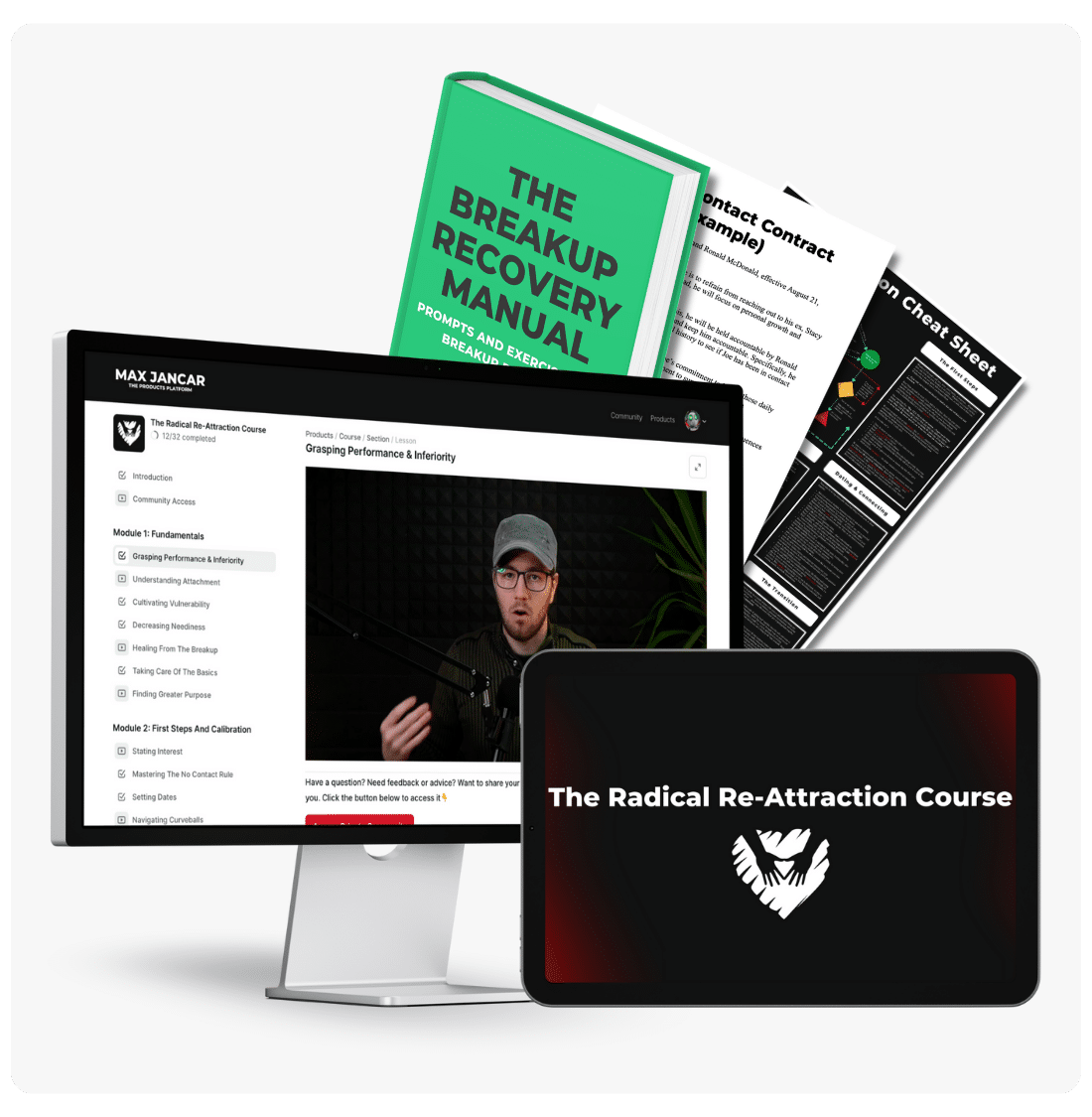Click play to listen to this article.
Throughout our lives, we experience various feelings and adopt a series of identities and beliefs about ourselves and then seek validation to reinforce and prove those feelings, identities, and beliefs to ourselves and affirm that they are worthwhile and valid.
Considering this, we can define validation as the information or the confirmation we receive about our feelings, beliefs, and identities, or who we are as a person.
Popular ex-back advice often demonizes validation seeking, however, I don’t think its always so black and white. I believe seeking validation, to a certain degree, is normal.
Let me explain.
A no-nonsense guide for thoughtful people who want reconciliation without manipulation, games, or fake behavior — just authentic growth and deep psychological understanding.
Order Your CopyTypes Of Validation
Validation comes in two flavors: external and internal.
External validation is the approval and admiration of others — in your case, most relevantly, your ex. It makes you feel like you’re on cloud nine for a moment, but that moment is only temporary. The high of it usually fizzles out as quickly as it ignited.
For example, getting your ex on a date may make you feel excited, especially when you get to brag to your friends about it. But then you start acting up due to those damn needy tendencies and they stop returning your calls, now you feel like shit again.
Conversely, internal validation is the approval and admiration of yourself. It requires defining meaningful values and goals for yourself and then following through on them. External results matter less than devotion to one’s own values and goals.
For example, when you decide to not go batshit crazy when your ex hasn’t called you back for three days — that’s building internal validation. You’re validating your own chosen feelings, beliefs, and identities and meeting your own approval and set of standards regardless of the external circumstances.
This cheat sheet lays out a simple yet potent approach to mending a relationship — one rooted in raw authenticity that respects both your dignity and that of your ex.
Get The Free Cheat SheetWhen Seeking Validation Gets Toxic
Most ex-back advice on the internet parades about how you should stop seeking validation. Sorry to break it to you, but that’s impossible. You can’t run away from it; it’s an inherent part of you. It always was, and it always will be. In most cases, our need for validation is entirely healthy.
The only exception are people with a lot of shame, avoidant tendencies, or those who faced lots of trauma in their life. These people will often have an unhealthy need for validation. They’re the type who always need reassurance from others that they’re still cared for, loved, worthy, valuable, and appreciated.
The reason they manifest this excessive need for validation is because they’re insecure about their identities. They often don’t trust, respect, or love themselves.
And here’s the kicker: this doesn’t only apply to external validation. An unhealthy need for internal validation can be just as common and just as damaging.
Let’s unpack this idea.
The Dark Side Of External Validation
As a result of an excessive need for external validation, people turn into pleasers. A type of person that overcompensates for their flaws, tries to impress their ex, and seeks insufferable amounts of their attention and admiration.
As long as their ex approves of them and makes them feel superior and worthwhile, everything is fine. But as soon as the tides turn and they’re handed a shit-sandwich, they can’t handle it anymore and proceed to being controlling, jealous, obsessive, and overall desperate.
People fixated on external validation generally have little to no internal validation. This is because the unpredictability of the external validation demands all of their time and attention to maintain.
The Dark Side Of Internal Validation
As a result of an excessive need for internal validation, people turn into narcissists. A type of person that doesn’t respect their ex and often stubbornly continues to pursue them despite their rejections.
They do this because they believe their ex is simply emotional, immature, and confused, and therefore must be forcibly educated about why its right to give their relationship another go.
However, when such a person is met with undeniable evidence that contradicts their self-image — that they’re the only right partner for their ex — they explode with rage.
The facade of their self-perception, which they spent so much time building and keeping up, comes crashing down. At that point, they’re back on square one, feeling just as worthless and miserable and empty as they did before.
How To Form A Healthy Sense Of Validation (And What To Avoid)
A lot of ex-back material out there merely recommends people replace one form of validation with another. It either tells you to rid yourself of your need for external validation and validate yourself more often, or it tells you to validate yourself less and instead seek your ex’s validation more.
The first message is most prevalent in many Redpill/Manosphere inspired ex-back advice, while the second is most prevalent in many Law Of Attraction/Romanticism inspired ex-back advice.
The truth however is that both of these pieces of advice do nothing but harm. In most cases, they merely replace one unhealthy form of validation for another.
The problem is that rearranging where you get validation doesn’t deal with the root problem: the excessive need for it. Until you deal with that underlying, you’ll continue being a validation junkie.
So how do you deal with it?
First, acknowledge and accept that need for validation is innate. So the more you try to suppresses it into your unconscious, the more it will expand and grow. Hence the adage, “what we repress, expands.”
Next, acknowledge and accept that we all want to be liked, to feel competent and cool and even superior at times. And as long as these needs are met in a way that doesn’t compromise your internal values or autonomy, then it’s okay.
Last, acknowledge and accept that we all want to like ourselves, to feel good about ourselves, to feel accomplished and able. And as long as these needs are met in an honest way, without distorting our perceptions or manipulating others to achieve them, then it’s okay.
The key is achieving the right and healthy balance between the internal and external validation, with an excess of neither is ultimately to maintain awareness of our validation needs and then accept them. That’s all there is to it.
This cheat sheet lays out a simple yet potent approach to mending a relationship — one rooted in raw authenticity that respects both your dignity and that of your ex.
Get The Free Cheat SheetRelated Reading
- 12 Biases That Make You Overestimate Your Ex’s Attractiveness July 2, 2021
- Hope For Reconciliation: Don’t Kill It, Transform It Instead February 3, 2025
- The Do’s And Don’ts Of Being Friends With An Ex June 24, 2021
- Know When To Stop December 23, 2023
- Why No Contact Feels Like Hell (And Why That’s Actually Good) November 14, 2025
- 5 Stages Of A Rebound Relationship (And 3 Truth Bombs) May 17, 2022



